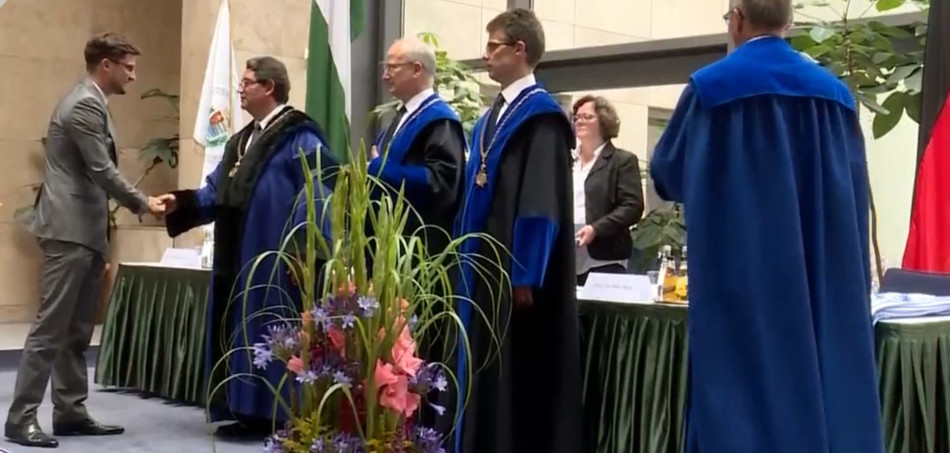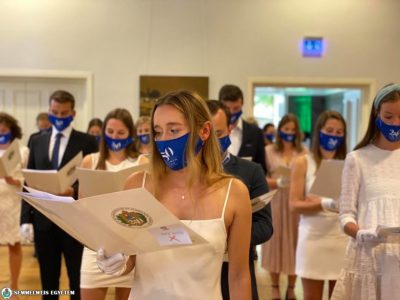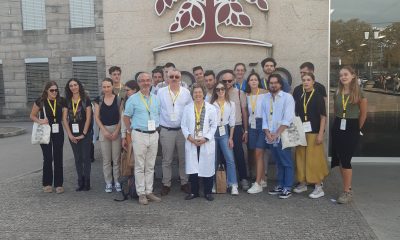The graduates were recognized as doctors by Dr. Béla Merkely, rector of Semmelweis University, Dr. Miklós Kellermayer, dean of the Faculty of Medicine, Dr. Alán Alpár professor, and from the part of the Hamburg campus, Dr. Péter Pál Bucsky, rector’s commissioner, and Dr. Karl J. Oldhafer, dean’s commissioner of ACH.
 In his comment to state news agency MTI, Dr. Béla Merkely said that education, health care and research in Germany is excellent, and if Semmelweis University can make a significant contribution to it, that indicates the high quality of medical education in Hungary, which boosts its worldwide reputation. The doctors who graduate from this program are proud of the country and university where they learned their profession, and thus they become our ambassadors around the world, the rector noted. He added that the medical doctors graduating from the German-language program receive a high-value diploma, and in addition to Germany, many of them get jobs in Austria and Switzerland. Dr. Béla Merkely emphasized that students graduating from Semmelweis usually also perform well in aptitude tests in the countries where this is necessary.
In his comment to state news agency MTI, Dr. Béla Merkely said that education, health care and research in Germany is excellent, and if Semmelweis University can make a significant contribution to it, that indicates the high quality of medical education in Hungary, which boosts its worldwide reputation. The doctors who graduate from this program are proud of the country and university where they learned their profession, and thus they become our ambassadors around the world, the rector noted. He added that the medical doctors graduating from the German-language program receive a high-value diploma, and in addition to Germany, many of them get jobs in Austria and Switzerland. Dr. Béla Merkely emphasized that students graduating from Semmelweis usually also perform well in aptitude tests in the countries where this is necessary.
The quality of education at Semmelweis University is also indicated by its international rankings, added the rector, noting for example that in the QS Ranking by Subjects, Semmelweis is ranked in the 201-250 range among medical universities, in the same quality range as the universities of Leipzig, Ulm and Düsseldorf, and thus putting it among the top 20 German universities. In the latest THE European Teaching Ranking, the only German institution to place ahead of Semmelweis University was the University of Heidelberg.
Around 40% of Semmelweis University students come from abroad, most of them from German-speaking countries, but the rector believes this number could double in the next five years. Each year, on average 200 students begin their studies in German at the institution, and half of them receive their diploma in Budapest or at the university’s off-campus site in Hamburg, while the other half finish their studies in one of the medical schools in Germany.
While medical training is carried out in 35 state and four private universities in Germany, there are only three training locations in Hungary that offer German-language medical programs. Of the 392,400 medical doctors registered in Germany in 2018, more than 1000 graduated from Semmelweis University. The first German diploma was awarded at Semmelweis University in 1989, and each year on average around six times as many applications are submitted for the German-language medical program as there are available slots.
Semmelweis University signed the cooperation agreement with the Asklepios Kliniken group, one of Germany’s largest hospital operators, 10 years ago on establishing the binational faculty in Hamburg, which operates under the supervision of the Faculty of Medicine.
Eszter Keresztes (source: MTI)
Translation: Tamás Deme
Photo source: MTVA


